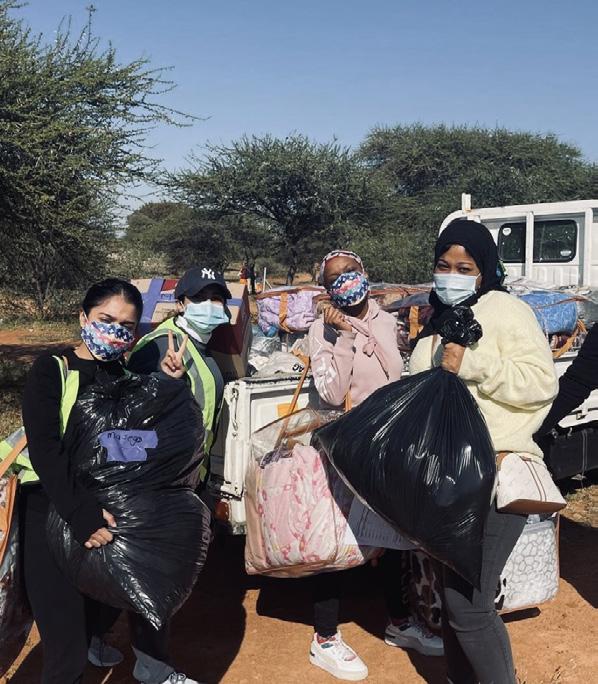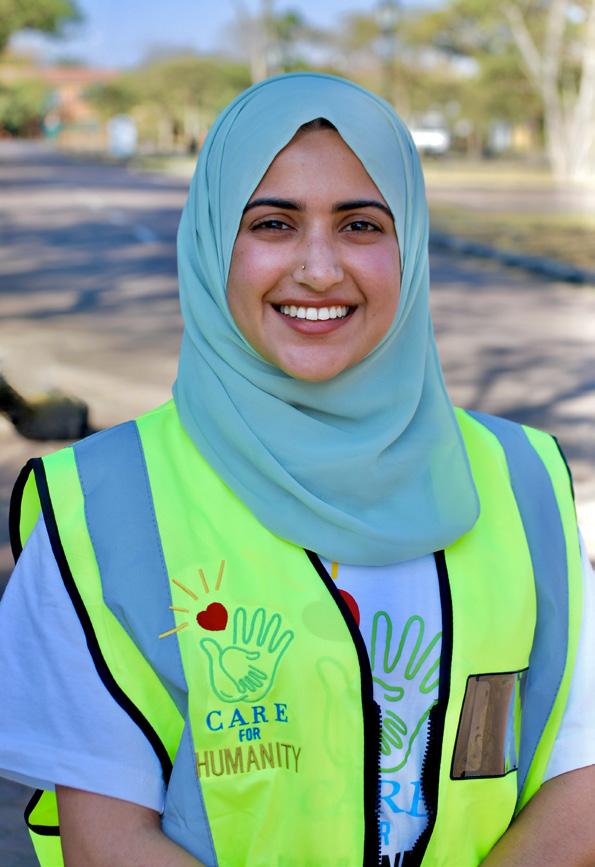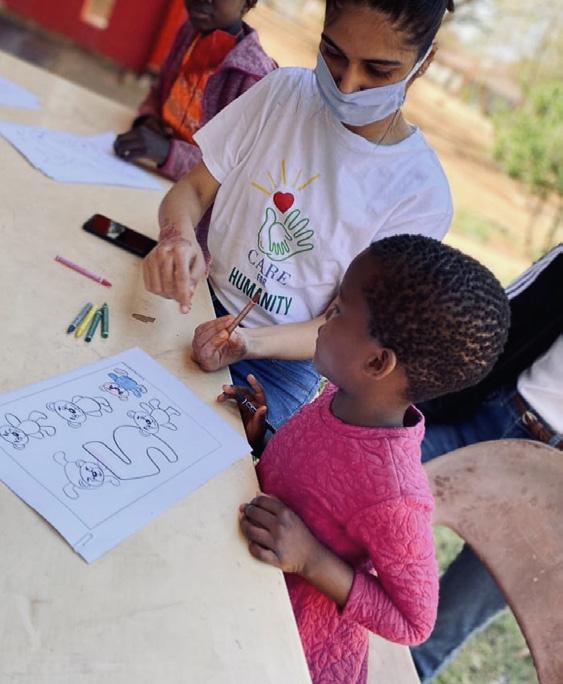
7 minute read
Care For Humanity: Youth-Driven Community Impact
By Lorraine Kinnear
The United Nations recognises young people as a critical human resource for development and as agents of social change, economic growth, and technological innovation. The United Nations strengthened its commitment to young people in 1995 when it adopted the World Programme of Action for Youth (WPAY), an international strategy to address their problems more effectively and increase opportunities for youth participation in society. Through UN General Assembly Resolution 58/133, the international community reaffirmed its commitment to youth participation, emphasizing the importance of full and effective participation of youth and youth organisations at the local, national, regional, and international levels in promoting and implementing the World Programme of Action and in evaluating the progress achieved and the obstacles encountered in its implementation. In Botswana one youth-run NGO is heeding the UN on this call. Care for Humanity is an NGO leveraging youth efforts to make a meaningful impact on communities. The story of this organisation is told by the organisation’s Founding Director, Afreen Dhansay.
Advertisement
Young people are empowered through active participation to play an important role in their own development and that of their communities, assisting them in learning essential life skills, developing knowledge of human rights and citizenship, as well as promoting positive civic action. Participation in work that makes a

difference is a basic human right that is needed the most right now as many communities are finding their feet from the ripple effects of Covid-19. This is one of the guiding principles of the Universal Declaration of Human Rights, and it has been echoed in numerous other conventions and declarations. To effectively participate, young people must be provided with the necessary tools, such as information, education, and access to their civil rights. Passionate and affectionate, Afreen Dhansay has found her purpose in helping communities through empowering the youth to get involved in community work. Afreen is the founding director of NGO Care for Humanity which was established in 2019, just before COVID started. The organisation was forged by a small circle of friends and it was established to address the needs of those who have not been so fortunate in life. Between 2019 and 2020 the organisation gained some traction but activities were unfortunately halted by the Covid-19 pandemic that forced many into mandatory movement restrictions. Once Covid-19 started to clear the group resumed activities and have since grown substantially. They grew not only by the number of communities they serve but have seen a rise in volunteers and other stakeholders taking a keen interest in being part of this movement. As a youth-run organisation Care for Humanity strategically targeted volunteers who are under the age of 21 as a means of instilling a sense of community in them and allowing them the opportunity to get hands-on work experience by helping those in need. TRC: Please provide a brief background of Care for Humanity AD: Care for Humanity is hugely centered around providing relief and assistance throughout the country.
As a project that started in Gaborone we have had our reach in Gaborone and surrounding areas. What typically happens is that team members would identify potential beneficiaries and then we would do an assessment of the need and how we can get involved. Once a project has been approved we physically go assess the situation and then we provide our assistance however best possible. Care for Humanity currently has two main focus areas; providing assistance and relief for those in need throughout the country as well as encouraging youth involvement in community impact projects to instill in them a sense of responsibility and care for humanity from the grassroots levels. The average age for our team members and volunteers is 21 and we believe that this is impactful both for communities and for the volunteers themselves.
Before beginning work with us, the majority of volunteers don’t really know where they belong, and so they come to the organisation looking to establish a sense of purpose and belonging. We recognise that not everyone has the ability to address their needs and those of their families and we firmly believe that the most human action to apply in these instances is to channel resources towards helping those members of society that have not been so fortunate. We allow team members and volunteers to interact with potential
beneficiaries, we let them empathise and propose potential solutions for those situations. This provision of relief tends to be more sustainable because when you allow young people to get creative in coming up with solutions they can see beyond just the current challenges but they can find other ways to prevent those same problems happening again. We help families and communities with basic necessities, food, clothing, and in some instances with shelter. Based on the assessments we run we help families with an array of things such as school fees, stationery, groceries and other monthly necessities on a case by case basis. TRC: Who are the key beneficiaries of Care for Humanity and how do you identify them? AD: As alluded to before, for new projects we normally have either volunteers or strategic partners identify a specific individual or community in need and we will run an assessment to gauge how much work we need to invest in this particular case. Our strategic partners include some other NGOs and Human Rights organisations such as Ditshwanelo - The Botswana Centre for Human Rights, Childline Trust, Centre for Gender Based Violence and they play a vital role in helping us identify areas that need relief and aid. We're currently working in Ranaka village. We started off by visiting one person who we knew personally who stays in the village and she just mentioned that there are a lot of humanitarian challenges in her village. Most people don’t have access to basic needs such as direct access to clean water and other key essentials. The team immediately went to do the assessment to see where we could be of aid.
We started off Care for Humanity providing assistance and relief mainly to vulnerable children. The reason for this was that the first project we undertook was offering aid to two orphanages. The SOS Children's Village in Tlokweng, and the Gamodubu Children's Home in Gamodubu. I would go there in my personal capacity and free time with my sisters, and we created a little bit of a bond with the children and in that instance we also identified gaps that we could close ourselves. Although the children are in shelters and get basic necessities, we could not ignore the fact that their lives were not ideal. With the help of my friends we found it fitting to bring a little bit of light and happiness to their lives. The NGO officially started with a focus on vulnerable children. We tried to help mostly orphaned and vulnerable children in the villages - those in shelters and those who are living with other family members that are struggling to meet the needs of the children.
Another key player throughout our journey is Learn to Play - Ithute Go Tshameka which has allowed us to do interaction or learn to play programs. This got us interacting with the kids, trying to create a safe space for them to tell us about their challenges. We then moved on to helping families




who are providing for many small children, and now we help everybody that comes our way with a key focus on orphans and vulnerable children.
As orphans and vulnerable children are a key focus area of ours, we try by all means to address any request for aid. In families where we believe that our work could be needed, we start off by assessing the amount of people that are in the family and we do like a brief observation looking at how the conditions are at home, that is, do they stay in a proper house? Is the house livable and other factors such as access to water and other basic necessities.
In some families, it is immediately obvious that these people really require aid. Where it's not so obvious, we then bring forth a more holistic assessment. TRC: What are some of the activities and initiatives you plan on undertaking soon to create an impact in the lives of Botswana? AD: Care for Humanity is currently in the early stages where we are establishing ourselves both from an organisational structure point of view as well as from a specialised or focus area of delivery. We are registering Care for Humanity as a Trust and not as an NGO under the Registrar of Societies. Although this process is taking some time we are on this ground doing all the work we can. Ahead of officially operating as a Trust we have pooled some resources from volunteers and team members to solve the pressing issue of running water and sanitation in Mmanoko village. We have initiated the process of drilling a borehole in Mmanoko village.











